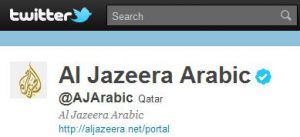Yesterday, my colleague, Alex Margolin commented on the role of Facebook and Twitter in Egypt’s protests. There’s no question social media is playing a key role. But there’s a facet that needs more scrutiny.
The media’s role, specifically Al-Jazeera.
George Washington U. professor Marc Lynch would call it not a “Twitter Revolution,” but more accurately, a “New Traditional Media Revolution”:
I would suggest that analysts not think about the effects of the new media as an either/or proposition (“Twitter vs. Al Jazeera”), but instead think about new media (Twitter, Facebook, YouTube, SMS, etc) and satellite television as collectively transforming an complex and potent evolving media space. Without the new social media, the amazing images of Tunisian protestors might never have escaped the blanket repression of the Ben Ali regime — but it was the airing of these videos on Al Jazeera, even after its office had been shuttered, which brought those images to the mass Arab public and even to many Tunisians who might otherwise not have realized what was happening around their country . . .
Al Jazeera and the new media ecosystem did not only spread information — they facilitated the framing of the events and a robust public debate about their meaning. Events do not speak for themselves. For them to have political meaning they need to be interpreted, placed into a particular context and imbued with significance. Arabs collectively understood these events quite quickly as part of a broader Arab narrative of reform and popular protest —the “Al Jazeera narrative” of an Arab public challenging authoritarian Arab regimes and U.S. foreign policy alike. Events in Tunisia had meaning for Jordan, for Lebanon, for Yemen, for Egypt because they were framed and understood within this collective Arab narrative.
There are plenty of Western journalists in Cairo reporting the news to the English-speaking world. But Al-Jazeera’s different. It broadcasts in Arabic, and enjoys a degree of credibility — deserved or not — with the with the proverbial Arab street. Mubarak knew a news blackout was futile, but he banned Al-Jazeera.
Why single it out?
Perhaps Mubarak realized — too little, too late — what Al-Jazeera seems to be figuring out. What we like to call “history’s first draft” can no longer be called a “draft.” It’s becoming more of an interactive merger of professional “news” coverage with status updates, photos, videos, thoughts, etc. But there’s more: Al-Jazeera and the protest are having a multiplying effect — spreading each other’s info across their communities, and from there, to the wider Arab world. In real-time, no less.
Al-Jazeera succeeded in joining the protest movement in framing First Draft 2.0., which means Mubarak’s becoming History 101.


